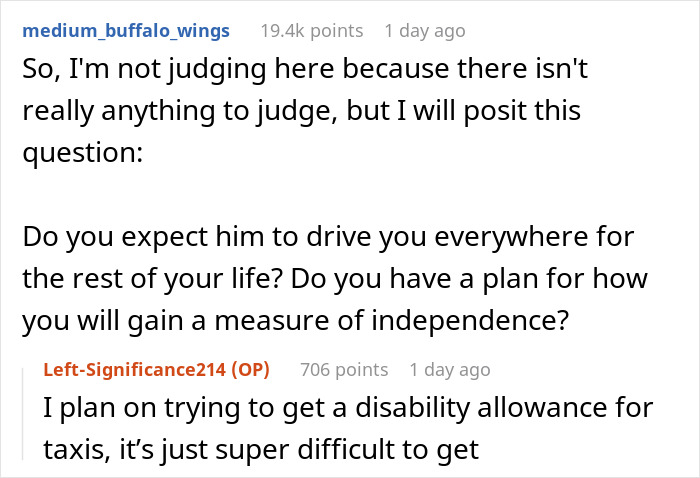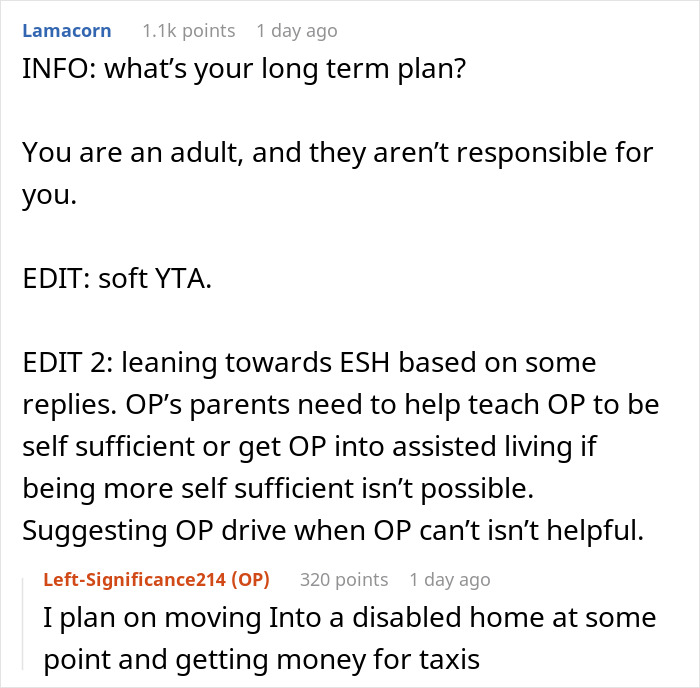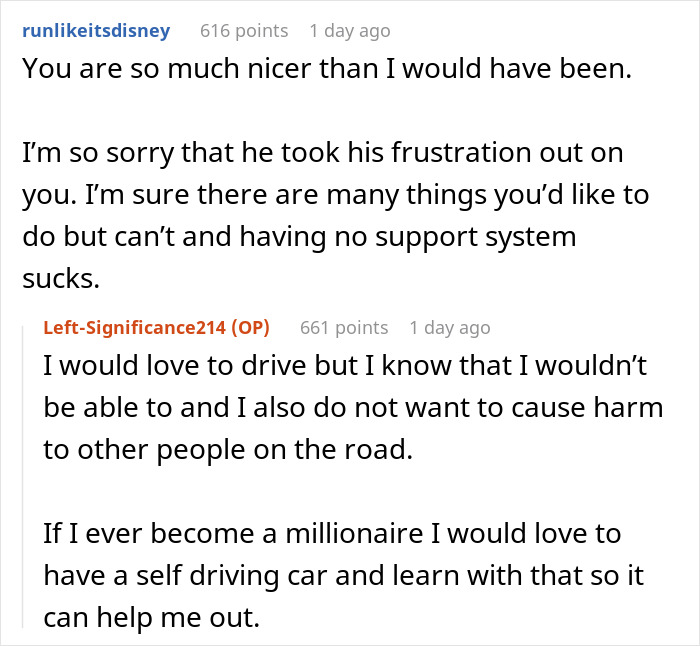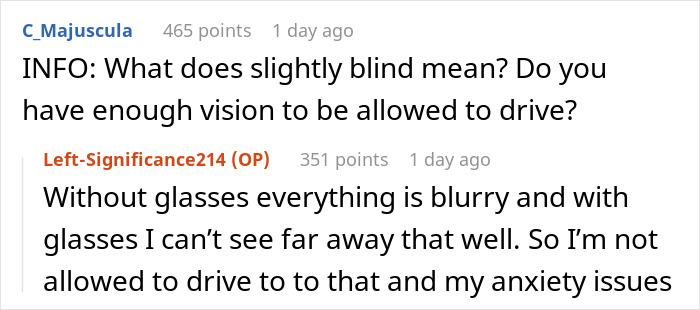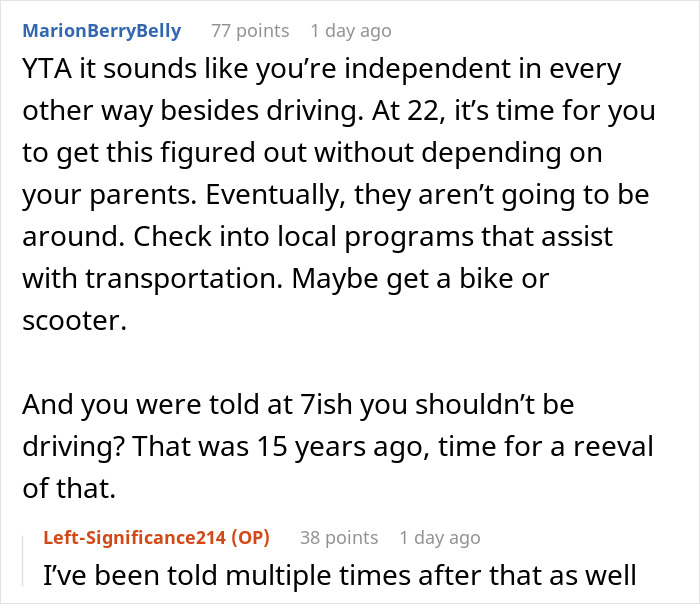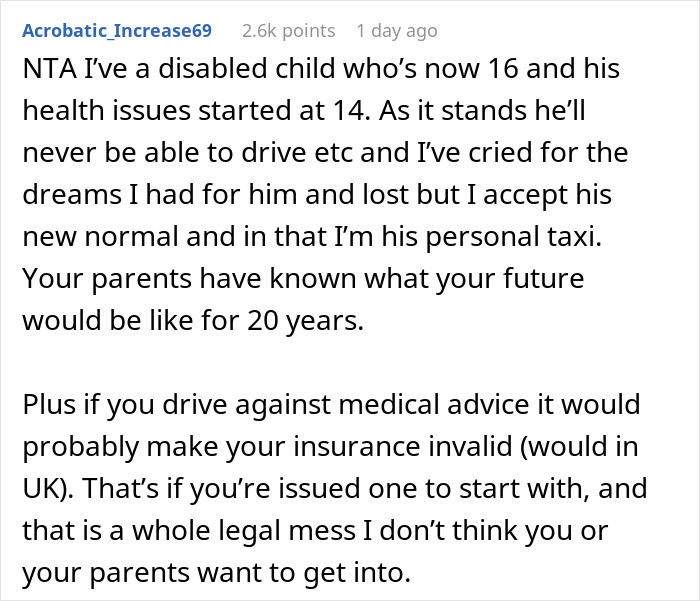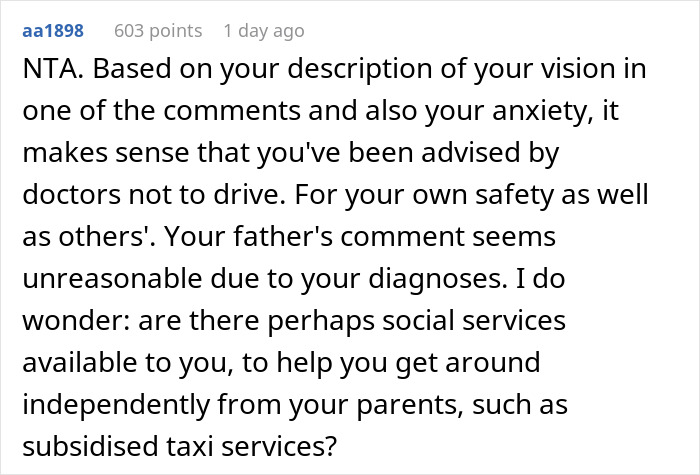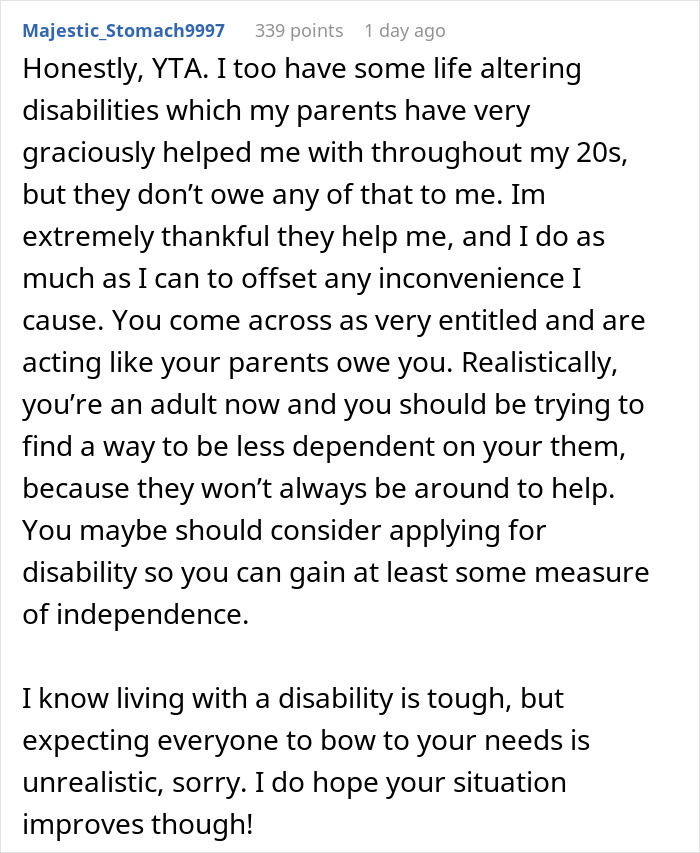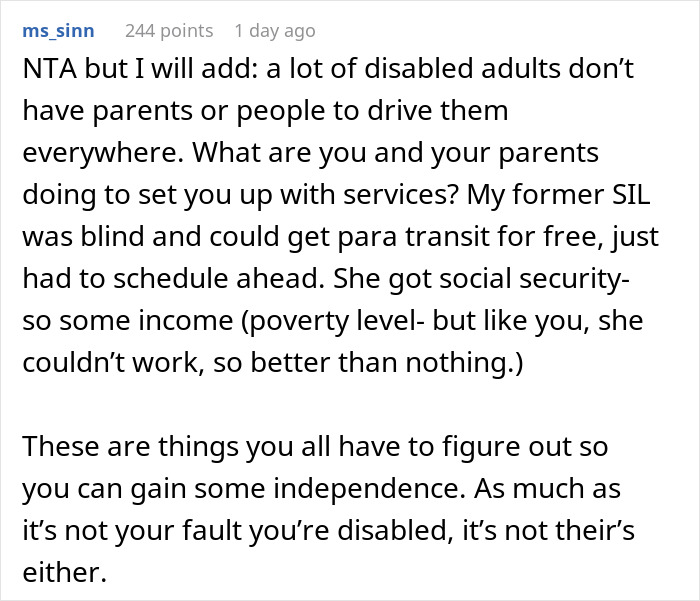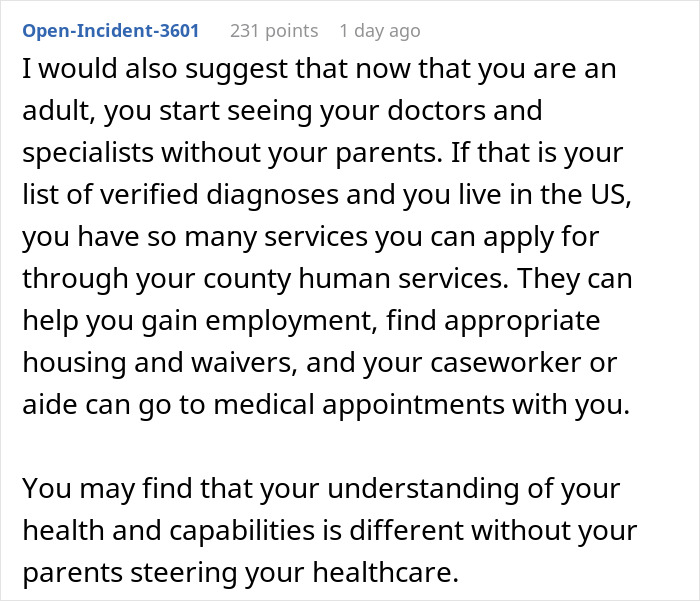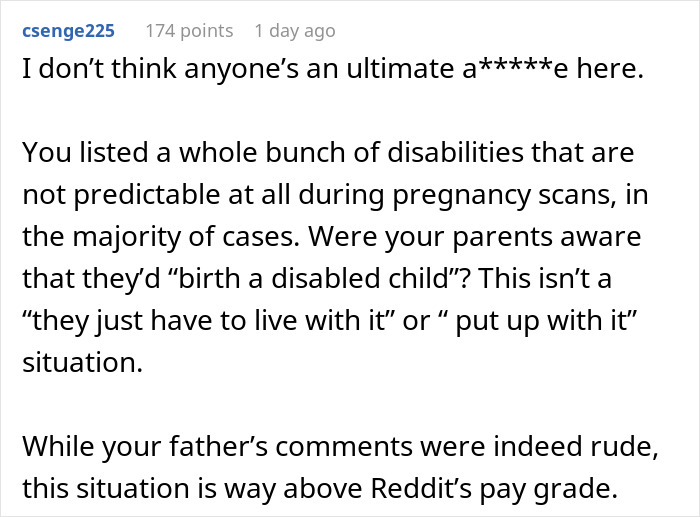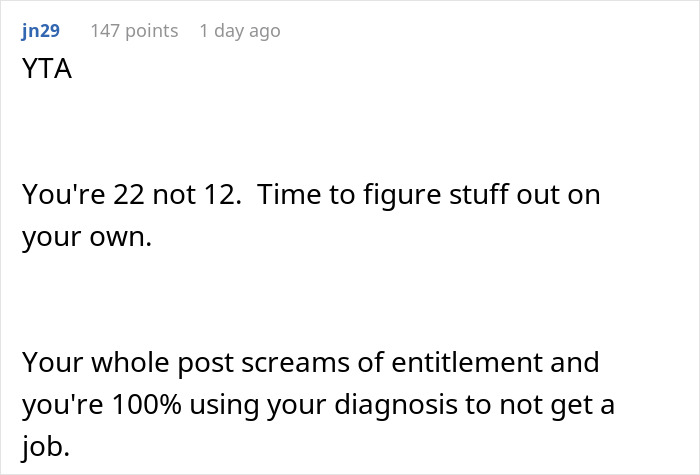People often fret about being able to drive as soon as they reach adulthood. Most folks are expected to learn the skill and drive themselves around, but not everyone wants to, has the time, or even the capability.
Managing a car and being out on the road can be extremely tough, especially for someone with a disability. A woman shared her experience of not being able to drive and that a doctor had told her not to. She then mentioned that her dad voiced how tired he was of driving her around and that she stood up to him.
More info: Reddit
Frustrated dad says he hates having to pick up disabled daughter all the time, she shuts him down saying that when you have a disabled kid it’s something you have to live with

Image credits: cottonbro studio (not the actual photo)
22YO disabled woman with several mental and physical health diagnoses was told by doctors not to drive, so she used to travel by bus or ask to be driven around
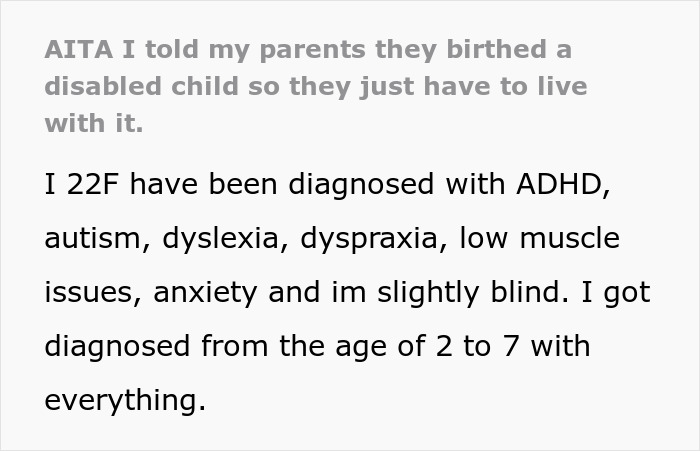
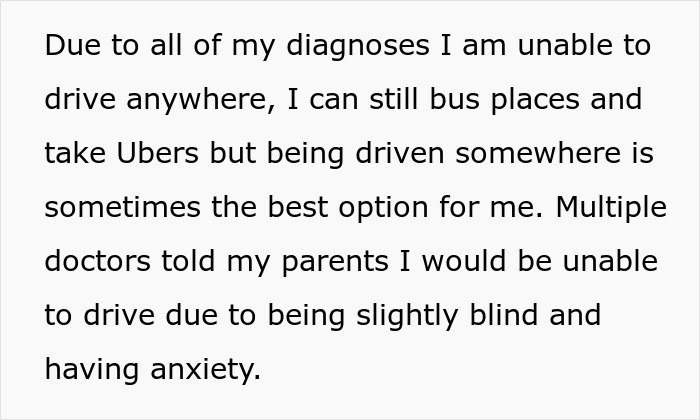


Image credits: Norma Mortenson (not the actual photo)
Her dad picked her up 1-2 times a week but this time he said he hated having to drive her around and that it would be easier if she learned how to do it despite what doctors said
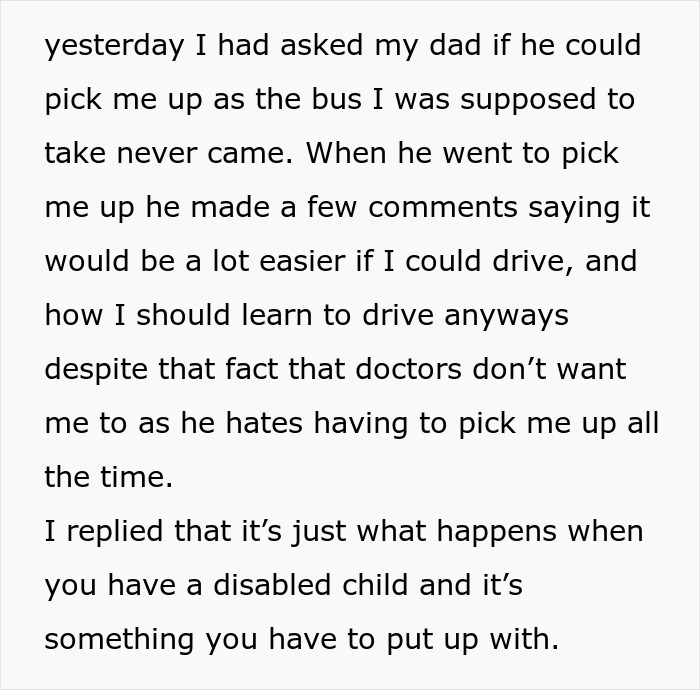

Image credits: u/Left-Significance214
She told him to put up with this because he has a disabled child, but he took offense to what she said and her mother also told her that she was being rude

Image credits: Andrea Piacquadio (not the actual photo)
The Original Poster (OP) is a 22-year-old woman. She shared that she has been diagnosed with ADHD, autism, dyslexia, dyspraxia, low muscle issues, anxiety, and slight blindness. She received all these diagnoses between the ages of 2 to 7. Because of her anxiety and partial blindness, doctors told her parents that she would be “unable” to drive. As to how she gets around, the poster shared that she typically uses public transport or asks to be driven to places. Since she doesn’t have a full-time job, she cannot afford to take an Uber frequently.
The OP told commenters: “I would love to drive but I know that I wouldn’t be able to and I also do not want to cause harm to other people on the road. If I ever become a millionaire I would love to have a self-driving car and learn with that so it can help me out.” When asked about her vision issues, she stated, “without glasses everything is blurry and with glasses I can’t see far away that well. So I’m not allowed to drive.”
A study by the Bureau of Transportation Statistics found that only 60.4% of U.S. residents with disabilities drive a car, compared to 91.7% of people without impairment. People with disabilities are also 2-3 times less likely to live in a zero-vehicle household if they work outside their homes. It’s important for most folks to have adequate transportation to get around for work and other tasks, and those with impairments are no different.
According to Salon, “being unable to drive isn’t merely an inconvenience. It becomes another manifestation of a person’s disability, and a particularly debilitating one at that. Because driving requires complex physical and psychological tasks, even two people with the same disability may struggle to drive for different reasons.” This leaves disabled people at the mercy of friends and family to help them out. The poster also thought about this issue in depth and told commenters: “I plan on moving into a disabled home at some point and getting money for taxis.”
Bored Panda interviewed Lisa Lightner, a special education advocate who started A Day in our Shoes to get her perspective on the situation. When asked whether it’s important for a disabled adult to try and be more independent, she said: “Absolutely, for all of our kids, we should try to maximize independence. But, it’s important to keep in mind that our society is not really built for disabled people. The jobs, access, health care, recreation… none of it is particularly disability-friendly. Some kids will need support their whole lives, and that’s okay. We should celebrate all levels of disability. We cannot predict outcomes, but we should work toward maximizing skills.”

Image credits: Nicola Barts (not the actual photo)
One day OP called her dad to pick her up because the bus she was going to take didn’t come. But when he arrived, he told her that he hated having to drive her around all the time. He wanted her to learn how to drive despite the fact that doctors had cautioned her not to. She clapped back at him saying that it was just what one had to deal with when they had a disabled child. But her father got angry with her, and later on, her mother also backed him up.
We asked Lisa whether it’s fair for parents of children with disabilities to voice their concerns and frustrations to their adult kids. She said, “no, not if it’s something out of their control. A disability should never be treated as a character flaw. Skill deficits due to a disability should never be treated as a character flaw. Whenever assessing what’s going on, a parent should ask themselves, is this a ‘can’t’ situation or a ‘won’t’ situation? Is it because my child can’t do it, or because my child won’t do it? Too often the can’ts get treated as won’ts.”
It might seem harsh for her father to express his frustration about having to pick her up and drop her off 1-2 times a week. But parents of kids with disabilities often have a lot to deal with as well. According to Virtual Lab School, “it’s important to recognize that they often have additional roles and responsibilities specific to their child’s needs. This can be extremely stressful for primary caregivers; it is important that you understand the impact on families’ stress and well-being.”
Research has shown that family caregivers are often at increased risk for adverse physical and psychological health conditions compared to non-caregivers. They also have more time commitments associated with caregiving and might have to deal with additional stressors related to the health of their child. This, coupled with the financial and physical strain, low self-efficacy, and concerns about the future, can affect a caregiver’s mental health.
At that moment, the woman might have lost her cool and snapped at her dad for voicing his frustration, but it’s important to understand both sides properly. As the OP shared, she has been trying her best to manage transportation on her own. Because she doesn’t make enough money, she can’t afford to take private taxis. The dad’s words might have been hard to hear, but such statements tend to also come from a place of concern and worry.
Both the daughter and her dad could have reached an understanding by simply voicing their concerns to each other. But misunderstandings tend to fuel the fire. This viral post got 15k upvotes and 3.1k comments with some people even sharing their personal experiences of having to care for their disabled children. Who do you think was right in this situation? Let us know your thoughts in the comments.
Netizens were divided over the post, some felt that the dad was being unreasonable while others told the poster not to take her parents for granted and to be more responsible
